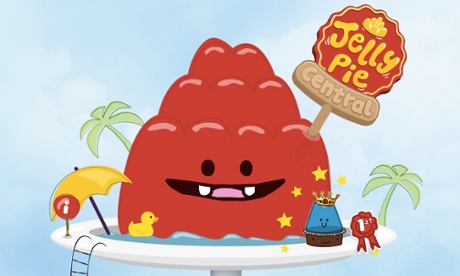
In 2013, if you're involved in children's entertainment, you're increasingly unlikely to be focusing on one medium or product. TV channel CBeebies makes mobile games, virtual world Moshi Monsters makes magazines, and apps company Outfit7 is working on a TV show from its Talking Friends apps.
It's also why a book publisher like Egmont's new thing is a "multi-platform humour brand" called Jelly Pie, which launched earlier this year as an HTML5 website, a YouTube channel and a mobile game. Jelly Pie is also acting as an umbrella brand for Egmont's humour books, including its popular Mr Gum and Agatha Parrot series.
The project is headed up by digital publisher Stephanie Gauld, who joined Egmont in September 2012 having previously launched virtual world Club Penguin for Disney in Europe, and before that having worked at the BBC handling CBeebies' interactive strategy.
"Egmont has been in the business of making children laugh for a long time with some really successful humour books, but could we take inspiration from that and create a multi-platform humour brand for five to nine year-olds?" says Gauld.
"Jelly Pie is a bit of an experiment: let's build our community first around this digital content, build up a fanbase, and then explore other revenue streams later, which could be live events, merchandise or apps."
Jelly Pie is based around two animated characters – yes, a jelly and a pie – with the emphasis on humour, clips and on children themselves, as they tell jokes and interview authors for the Jelly Pie YouTube channel.
The Jelly Pie mobile game has been downloaded by more than 100,000 people, with a recent spike of 65,000 downloads in a week thanks to Apple promoting it in the US App Store, as well as an enthusiastic video review by YouTuber Lonnie Dos.
The YouTube channel is taking longer to build up a head of steam, with 43 subscribers and 2,745 views at the time of writing. Gauld says that Egmont is keen to use digital platforms and mobile devices to find an audience for its new brand.
"The whole industry is adapting to this, and becoming aware of the importance of intellectual property. Part of Jelly Pie for us is exploring and creating our own IP and characters as part of that," says Gauld.
Egmont worked with digital production company Complete Control on Jelly Pie, with the HTML5 website aiming to ensure children can use it on tablets as well as computers.
The humour aspect is important, as is the element of live performance on Jelly Pie, with the videos of children telling jokes, rather than simply publishing them in text form.
"We did some user testing in a school and were telling jokes from a joke book to some younger children, and they just didn't get them. The language was too sophisticated," says Gauld.
"Then we let them listen to jokes performed by actors, and they were suddenly all hilarious. We realised that a lot of the humour was in the performance, and that influenced how we present jokes on the website."
Gauld adds that when questioned about what made them laugh, it was also surprising how many children cited specific people in their class – "when Harry goofs around, or when Ned is really silly" – which was another reason for making children the stars of the show, alongside the animated characters.
It must have been tempting to shoehorn in more explicitly educational content, but Egmont is choosing to focus on entertainment for now, although the inclusion of book recommendations provides a literacy aspect.
"Laughter is so important. I think children are under pressure at the moment, and humour is something that defuses the situation and relaxes them. And it's a bit of social currency, it helps with those social interactions," says Gauld.
"Having children myself, I do see the pressures they're under, and the importance of relaxing, humour and being able to be creative. So it's very consciously not educational: it's pure entertainment value, with really good humour that isn't patronising children."
Its very early days for Jelly Pie, which is trying to find an audience on two of the most crowded digital platforms around: YouTube and the App Store.
But it's an example of the kind of experimentation we're going to see more of from book publishers, who have ambitions to bring their enthusiasm for stories and characters beyond the printed page.

